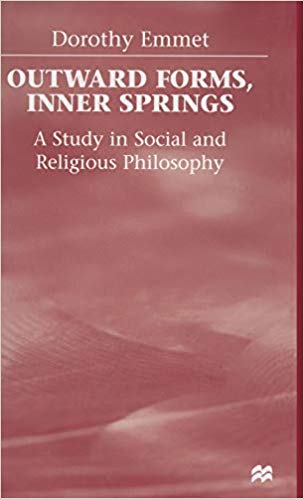Background
Dorothy Emmet was born on September 29, 1904, in London, England, the United Kingdom. Emmet's father was a scholarly country parson in West Hendred, Berkshire, who encouraged wide reading and discussion.

Eastern Road, Brighton, Brighton and Hove, BN2 5JF, United Kingdom
Dorothy Emmet went to St Mary's Hall, Brighton, where the headmistress emphasized the importance of precision in the use of words. She later remarked this was "not a bad background for philosophy."
Norham Gardens, Oxford OX2 6QA, UK
In 1923 Emmet went to Lady Margaret Hall, Oxford, to study classics and philosophy.

(The concept of Process is often used but seldom discussed...)
The concept of Process is often used but seldom discussed. In this book, Dorothy Emmet treats the idea as a key concept in describing what goes on in the world. She shows how a process differs from a succession of events, facts, or just things changing, and claims that causation should be seen in terms of processes.
https://www.amazon.com/gp/product/0877228965/?tag=2022091-20
1992

(With a wealth of anecdote, Dorothy Emmet looks back on th...)
With a wealth of anecdote, Dorothy Emmet looks back on the philosophers who made a personal impact on her. She brings to life the Oxford of the 1920s and writes particularly about H.A. Pritchard and R.G. Collingwood.
https://www.amazon.com/gp/product/0333670132/?tag=2022091-20
1996

(Building on the philosophies of the social sciences and o...)
Building on the philosophies of the social sciences and of religion, the book is concerned with the interplay between the inner powers of individuals and the structures of their societies and also with how these inner powers affect how they see outer realities.
https://www.amazon.com/gp/product/033372755X/?tag=2022091-20
1998
Dorothy Emmet was born on September 29, 1904, in London, England, the United Kingdom. Emmet's father was a scholarly country parson in West Hendred, Berkshire, who encouraged wide reading and discussion.
Dorothy Emmet was taught by her father, and a governess, until she was in her teens; then, in 1918, she went to St Mary's Hall, Brighton, where the headmistress emphasized the importance of precision in the use of words. She later remarked this was "not a bad background for philosophy".
In 1923 she went to Lady Margaret Hall, Oxford, to study classics and philosophy.
Emmet was a philosophy professor and author of several books. In 1931 Emmet lectured at Armstong College (now Newcastle University) and later moved to the University of Manchester. She was a professor at Manchester and head of the philosophy department, eventually being named dean of the Faculty of Arts in 1962. She retired in 1966.
Her first book, Whitehead’s Philosophy of Organism, was published in 1932 and dealt with the works of fellow philosopher A. N. Whitehead. Other books focused on subjects as varied as metaphysics, religion, and society in general and include The Nature of Metaphysical Thinking, Justice and the Law, and Rules, Roles, and Relations. Her autobiography, Philosophers and Friends: Reminiscences of Seventy Years in Philosophy, was published in 1996 and her last book, Outward Forms, Inner Spring: A Study in Social and Religious Philosophy, was published in 1998.
In more than 20 years at Manchester, Dorothy Mary Emmet showed grace and charm as well as practical wisdom and firmness in dealing with the business of the department and, as dean of arts from 1962 to 1964, with that of the faculty. She was elected an emeritus fellow of Lucy Cavendish Hall in Cambridge and an honorary fellow of Lady Margaret Hall.
(Building on the philosophies of the social sciences and o...)
1998(With a wealth of anecdote, Dorothy Emmet looks back on th...)
1996(The concept of Process is often used but seldom discussed...)
1992
